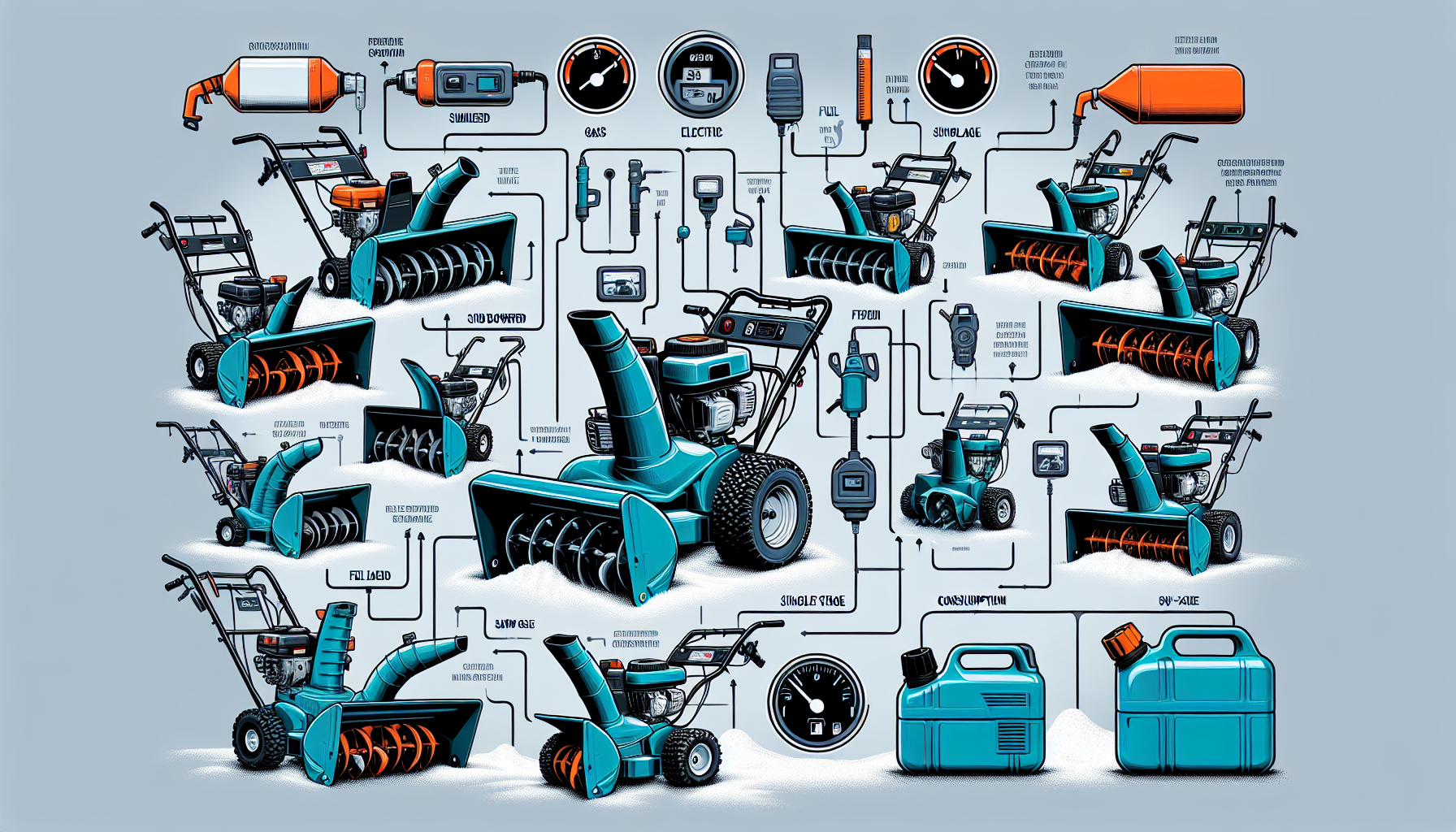If you’re gearing up for winter and contemplating buying a snow blower, you might be wondering just how much gas these machines devour. We all know that snow removal can be a tedious and time-consuming task, so it’s crucial to know if you’ll be spending a fortune on fuel. In this article, we’ll shed some light on the gas consumption of snow blowers and give you a better understanding of what to expect when it comes to their fuel efficiency. So, grab a cup of hot cocoa, sit back, and let’s explore the world of snow blowers and their gas consumption together!

Overview
Definition of snow blowers
Snow blowers are mechanical devices designed to clear large amounts of snow from driveways, sidewalks, and other surfaces. They are powered by either electricity or gas, with gas-powered models being more common. Snow blowers are equipped with an auger or impeller that scoops up snow and throws it out through a chute, making the task of snow removal faster and easier.
Importance of gas usage in snow blowers
Gas usage is a crucial factor to consider when using snow blowers. Since most snow blowers are powered by gas, understanding the factors that affect gas consumption and exploring alternative power sources is important. This article will delve into the various factors that influence gas consumption in snow blowers, compare the gas usage with other snow removal methods, provide tips to reduce gas consumption, and discuss the environmental impact of gas-powered snow blowers.
Factors affecting gas consumption in snow blowers
Power source
The power source of a snow blower significantly impacts its gas consumption. Gas-powered snow blowers tend to use more gas compared to their electric counterparts. While electric snow blowers are more energy-efficient and produce less pollution, gas-powered snow blowers have more power and are better suited for heavy-duty snow removal tasks. It is important to choose a snow blower based on the specific needs of your property, considering both power requirements and gas consumption.
Blower size
The size of the snow blower is another important factor that influences gas consumption. Larger machines often have more powerful engines, which can result in higher gas usage. It is crucial to match the size of the snow blower to the size of the area you need to clear. If you have a smaller driveway or sidewalk, opting for a smaller snow blower can help reduce gas consumption without compromising effectiveness.
Terrain and snow conditions
The terrain and snow conditions also play a role in the gas consumption of snow blowers. Operating a snow blower on steep or uneven terrain requires more engine power, leading to increased gas usage. Similarly, heavy and wet snow conditions can pose additional challenges, requiring the engine to work harder and consume more gas. Understanding the demands of your specific terrain and snow conditions can help you choose a snow blower that is efficient in terms of both gas usage and performance.
Operational usage
How you use your snow blower can significantly impact its gas consumption. Operating at higher speeds or using excessive throttle can result in increased gas usage. It is important to adjust the speed and throttle settings based on the amount and density of snow you are clearing. Additionally, avoiding excessive idling and shutting off the engine when not in use can help conserve gas.
Maintenance and tune-up
Regular maintenance and tune-up of your snow blower can also contribute to reducing gas consumption. Keeping the engine clean, changing the oil regularly, and properly maintaining the spark plug and air filter can improve the efficiency of the snow blower, resulting in lower gas usage. It is recommended to follow the manufacturer’s maintenance schedule and guidelines to keep your snow blower in optimal condition.
Gas usage comparison with other snow removal methods
Shoveling
Compared to shoveling, snow blowers generally use more gas. However, they offer a significant time-saving advantage. While shoveling may be a suitable option for smaller areas or light snowfalls, for larger areas or heavy snow accumulation, snow blowers are the preferred choice due to their efficiency and less physical exertion.
Snow plows
Snow plows, typically attached to vehicles like trucks or tractors, are commonly used for clearing snow from roads and parking lots. While snow plows may offer a greater capacity for snow removal, they consume significantly more gas due to their larger engines. Snow blowers, on the other hand, are more fuel-efficient and provide versatility for clearing snow in various areas.
Snow pushers
Snow pushers are manual tools that allow for pushing snow off sidewalks and driveways. They do not require any power source and therefore do not consume gas. However, snow pushers are limited in terms of capacity and are more time-consuming compared to snow blowers. If efficiency and time are important factors, snow blowers are a more expedient option.
Snow throwers
Snow throwers, also known as snow shovels or snow scoops, are similar to snow blowers but are manually operated without any power source. They are designed to scoop up snow and throw it to the side. Like snow pushers, snow throwers do not consume gas but have limited capacity and may not be suitable for larger areas or heavy snowfalls.
Efficiency tips to reduce gas consumption
Choosing the right snow blower
Selecting the appropriate snow blower for your specific requirements can help minimize gas consumption. Consider the size of the area you need to clear, the density of snow typically encountered, and any specific terrain challenges. By choosing a properly sized snow blower with the right features, you can ensure efficient gas usage.
Proper maintenance and tune-up
Regular maintenance is crucial for optimal gas consumption. Follow the manufacturer’s guidelines for maintenance and tune-up, including checking the spark plug, replacing the air filter, and changing the oil as recommended. Maintaining a clean and well-functioning snow blower will ensure its fuel efficiency.
Operating efficiently
Operating the snow blower efficiently can contribute to reduced gas consumption. Adjust the throttle and speed settings according to the amount and type of snow you are clearing. Avoid unnecessary idling, as it wastes gas. Additionally, properly clearing the snow in one pass instead of going over the same area multiple times can help minimize fuel usage.
Clearing snow strategically
Clearing snow strategically can also help conserve gas. Start with the areas farther away from your desired destination, gradually working towards it. This reduces the need to backtrack and clear the same area multiple times. Additionally, understanding wind patterns can help you clear snow in a way that minimizes the chances of it blowing back onto already cleared areas, reducing the need for additional passes.
Alternative power sources for snow blowers
Electric snow blowers
Electric snow blowers are a greener alternative to gas-powered ones. They run on electricity, eliminating the need for gas consumption and reducing air pollution. Electric snow blowers are quieter, require less maintenance, and have lower operating costs. However, they are generally less powerful than gas-powered snow blowers and may not be suitable for heavy-duty snow removal.
Battery-powered snow blowers
Battery-powered snow blowers offer the convenience of being cordless and do not require gas consumption. They are environmentally friendly and produce minimal noise. Battery-powered snow blowers are suitable for smaller areas with lighter snow conditions. However, the run time of the battery is limited, and larger areas may require multiple battery charges, which can be time-consuming.
Environmental impact of gas-powered snow blowers
Air pollution
Gas-powered snow blowers contribute to air pollution through the combustion of fossil fuels. The emissions from burning gas, such as carbon monoxide and nitrogen oxides, can have detrimental effects on air quality, especially in densely populated areas. Minimizing gas consumption or exploring alternative power sources can help reduce air pollution.
Greenhouse gas emissions
The use of gas-powered snow blowers contributes to greenhouse gas emissions, primarily carbon dioxide (CO2). These emissions contribute to global warming and climate change. By opting for more fuel-efficient snow blowers or alternative power sources, individuals can reduce their carbon footprint and help combat climate change.
Noise pollution
Gas-powered snow blowers can be noisy, causing noise pollution in residential areas. The loud engine noise can disturb both the users of the snow blower and the surrounding neighbors. Electric and battery-powered snow blowers offer a quieter alternative, reducing noise pollution during snow removal operations.
Conclusion
Considering gas usage in snow blowers is essential to strike a balance between convenience and environmental impact. Factors such as power source, blower size, terrain, and snow conditions play a crucial role in determining gas consumption. Comparing gas usage with other snow removal methods highlights the efficiency of snow blowers. To reduce gas consumption, choosing the right snow blower size, proper maintenance, operating efficiently, and clearing snow strategically are important. Exploring alternative power sources like electric and battery-powered snow blowers can provide greener options. Understanding the environmental impact of gas-powered snow blowers, including air pollution, greenhouse gas emissions, and noise pollution, encourages individuals to consider more eco-friendly snow removal methods. By considering the importance of gas usage in snow blowers and its impact on the environment, individuals can make informed choices that prioritize efficiency while minimizing their carbon footprint.


